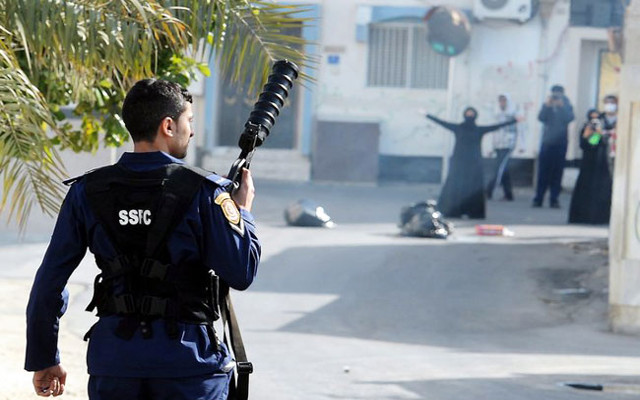29 June 2016 – Today marks one year since the US State Department lifted an arms hold to the Government of Bahrain. Americans for Democracy & Human Rights in Bahrain (ADHRB) calls on the US Government to assess the human rights situation in the country and re-instate a small arms ban to further prevent violent repression of peaceful political dissent.
On 29 June 2015, the State Department announced a lift on the four-year-long arms hold to Bahrain. US officials stated that the Government of Bahrain had made “meaningful progress on human rights reforms and reconciliation” and pointed to the recent release of prominent opposition leader Ebrahim Sharif. On 12 July 2015, after the release of the arms hold, Bahraini forces re-arrested Sharif. Courts charged him with “inciting violence” and “promoting political change” in response to a peaceful speech Sharif gave days prior. Sharif remains in prison on these charges.
Following the lifting of the arms hold, Senators Ron Wyden and Marco Rubio announced the introduction of S.2009. This bill would reinstate a hold on the sale of small arms to the Government of Bahrain until the country implements all 26 human rights recommendations outlined in the Bahrain Independent Commission of Inquiry (BICI). Following the Senate bill announcement in August 2015, Congressmen Joe Pitts, Jim McGovern, and Hank Johnson introduced House companion bill H.R. 3445 on 9 September 2015.
“US Congress recognizes that Bahrain has failed to meet their promises of human rights reform,” said Husain Abdulla, Executive Director of ADHRB. “Such legislation that supports a re-instatement of the arms hold makes clear to the State Department that Congress values the human rights of Bahraini citizens over political regional interests.”
The Bahraini government has a history of weaponizing small arms against its population. 87-year-old Habib Ebrahim died of complications from repeated incidences of tear gas inhalation after police forces fired tear gas into his home in January 2013. Later that same month, Bahraini forces attacked a village with heavy amounts of tear gas. 8-year-old Qassim Habib died from complications of tear gas inhalation. In November 2014, security forces shot a tear gas canister at Yousif Badah, which ripped his eyeball from its socket. Bahraini authorities shot Yousif with a tear gas canister while he attended a memorial in honor of his son. Bahraini authorities killed Yousif’s son, 16-year-old Ali Yousif Badah, during the 2011 pro-democracy uprising. Security forces used a Humvee to pin Ali against a wall and crush him to death. S. 2009 and H.R. 3445 would ban the sale of both tear gas and Humvees to the Government of Bahrain.
In the past weeks, Bahraini authorities have made unprecedented efforts to repress free expression and civil society. Prior to the beginning of the 32nd Session of the Human Rights Council (HRC), Bahraini authorities banned at least six human rights defenders from leaving the country. These HRC-accredited individuals, including families of abuse victims, were not able to travel to Geneva to participate in the Council. On 13 June 2016, security forces arrested prominent human rights defender Nabeel Rajab on charges of “spreading false news.” While in prison, Rajab has suffered from heart conditions requiring medical attention. Rajab remains in detention, and his first trial date is set for 12 July. On 14 June 2016, the Bahraini government closed Al-Wefaq Society. Al-Wefaq is the largest political opposition in the country, and the leader of the organization, Secretary-General Sheikh Ali Salman, is already in prison on charges violating his free speech rights. On 20 June 2016, the Government of Bahrain revoked the citizenship of Sheikh Isa Qassim, who is a prominent spiritual leader in Bahrain. Sheikh Isa’s citizenship revocation has led to a mass sit-in around his house in Diraz, with protesters coming out in some of the largest numbers seen since 2011.
Five years after the pro-democracy movement, Bahraini authorities fail to make promised human rights reforms. The Government of Bahrain has time and again utilized small arms to attack its civilians, and continues to stifle free speech and civil society. The US government has a moral responsibility to halt all sales of small arms to Bahraini security forces until it abides by international standards and fully implements all of the BICI recommendations. ADHRB strongly encourages US Congress members to sign-on to S. 2009 and H.R. 3445 to prioritize human rights in Bahrain, helping ensure future regional stability.





